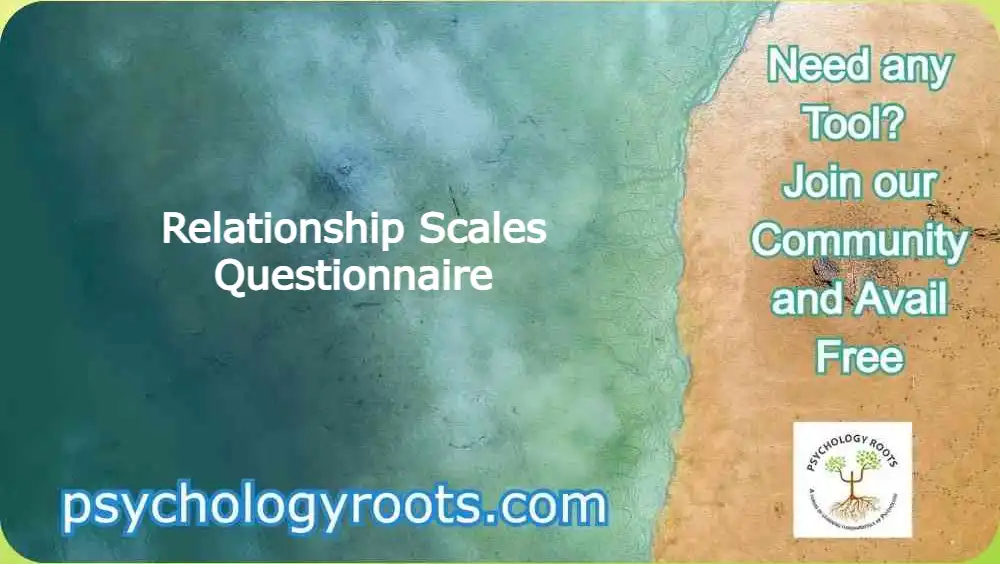Table of Contents
Relationship Scales Questionnaire
Here in this post, we are sharing the “Relationship Scales Questionnaire”. You can read psychometric and Author information. We have thousands of Scales and questionnaires in our collection (See Scales and Questionnaires). You can demand us any scale and questionnaires related to psychology through our community, and we will provide you with a short time. Keep visiting Psychology Roots.
About Relationship Scales Questionnaire
Scale Name
Relationship Scales Questionnaire
Author Details
Griffin and Bartholomew
Translation Availability
Swidish

Background/Description
The Relationship Scales Questionnaire (RSQ) was developed by Griffin and Bartholomew (1994). It is a 30 item self-report questionnaire designed to assess an individual‟s style of attachment in adult relationships. The questionnaire comprises a list of statements regarding close relationships and the respondent is instructed to rate the extent to which the statement describes them on a scale of one to five (Bartholomew, 2005; Griffin & Bartholomew, 1994). Although this study uses the original five-point scale (Griffin & Bartholomew, 1994), there is a seven-point version, provided by an internet website (Center for HIV Identification Prevention and Treatment Services, 2010).
The Relationship Scales Questionnaire (RSQ) is a widely used self-report instrument developed by Griffin and Bartholomew to assess adult attachment styles. Attachment theory, initially proposed by John Bowlby, plays a critical role in understanding interpersonal relationships. The RSQ is grounded in this theory and seeks to classify individuals into one of four attachment styles: Secure, Fearful, Preoccupied, or Dismissive.
The RSQ is an adaptation of Hazan and Shaver’s original attachment measure, incorporating elements of Bartholomew’s four-category model of attachment. This model provides a nuanced understanding of how individuals perceive and behave in relationships, influenced by their early interactions with caregivers. The RSQ helps individuals and researchers better understand the dynamics of their personal relationships, contributing to studies in social, clinical, and developmental psychology.
Administration, Scoring and Interpretation
The RSQ consists of 30 items, rated on a 5-point Likert scale, ranging from “Not at all like me” (1) to “Very much like me” (5). Respondents are asked to reflect on their relationship patterns and select the response that best fits their experiences.
Reliability and Validity
The RSQ has demonstrated acceptable reliability and validity in multiple studies. It has been validated in different populations and is widely used for research on adult attachment, relational dynamics, and emotional functioning. The instrument is particularly useful in exploring how attachment styles influence romantic relationships and personal interactions.
Available Versions
30-Items
Reference
Griffin, D. W., & Bartholomew, K. (1994). Relationship scales questionnaire. Journal of Personality and Social Psychology.
Important Link
Scale File:
Frequently Asked Questions
What does the Relationship Scales Questionnaire (RSQ) measure?
The RSQ measures adult attachment styles, classifying individuals into Secure, Fearful, Preoccupied, or Dismissive attachment categories.
How does the RSQ classify attachment styles?
The RSQ assesses four attachment styles—Secure, Fearful, Preoccupied, and Dismissive—based on responses to questions about relational patterns.
Can the RSQ be used in clinical settings?
Yes, the RSQ is used by therapists and counselors to understand attachment styles in clients and guide relationship-based interventions.
How long does it take to complete the RSQ?
The RSQ typically takes about 10-15 minutes to complete, depending on the respondent’s reflection on the items.
What is the main advantage of the RSQ in attachment research?
The RSQ offers a multidimensional approach to understanding attachment, providing insights into both avoidant and anxious dimensions of relational behavior.
Disclaimer
Please note that Psychology Roots does not have the right to grant permission for the use of any psychological scales or assessments listed on its website. To use any scale or assessment, you must obtain permission directly from the author or translator of the tool. Psychology Roots provides information about various tools and their administration procedures, but it is your responsibility to obtain proper permissions before using any scale or assessment. If you need further information about an author’s contact details, please submit a query to the Psychology Roots team.
Help Us Improve This Article
Have you discovered an inaccuracy? We put out great effort to give accurate and scientifically trustworthy information to our readers. Please notify us if you discover any typographical or grammatical errors.
Make a comment. We acknowledge and appreciate your efforts.
Share With Us
If you have any scale or any material related to psychology kindly share it with us at psychologyroots@gmail.com. We help others on behalf of you.